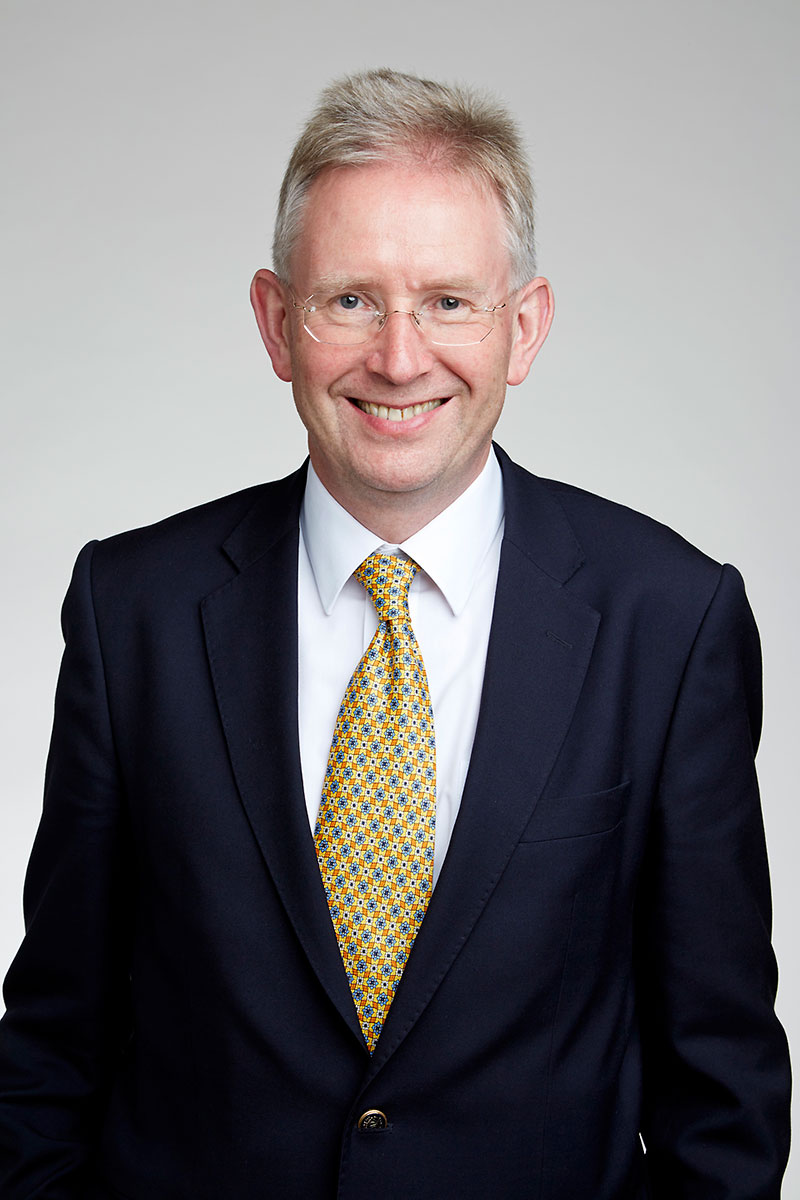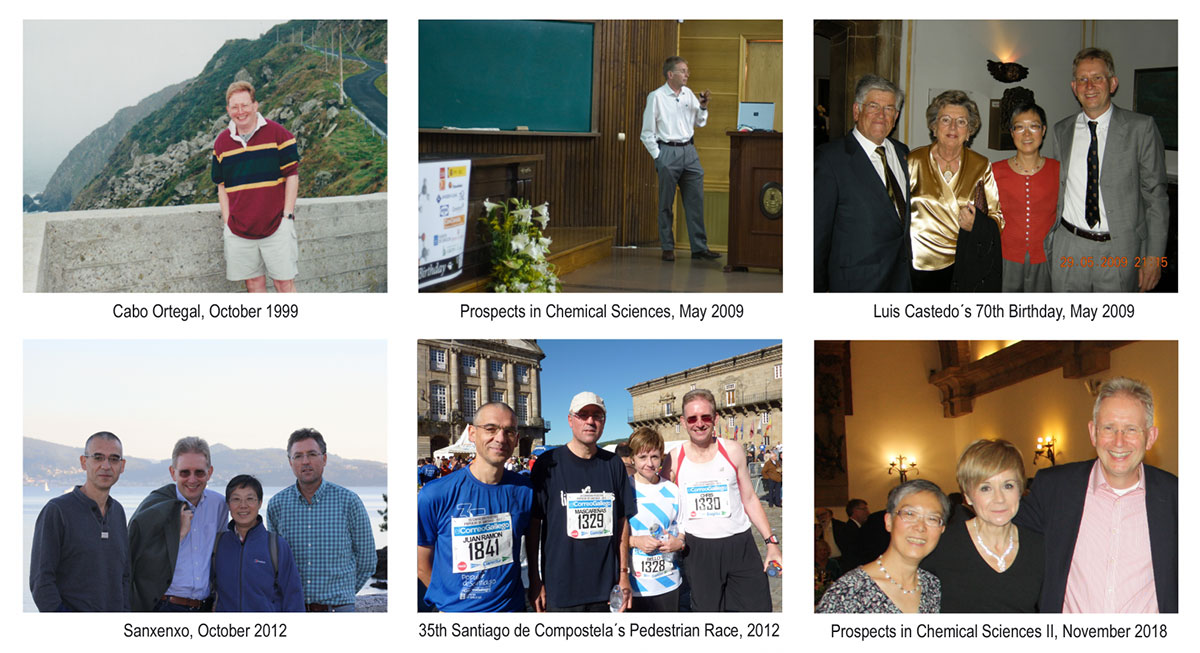 We deeply regret the sudden passing on 26th October of Professor Chris Abell from the University of Cambridge (UK), member of the scientific advisory board of the CIQUS, and a esteemed friend of many professors in the USC Organic Chemistry Department.
We deeply regret the sudden passing on 26th October of Professor Chris Abell from the University of Cambridge (UK), member of the scientific advisory board of the CIQUS, and a esteemed friend of many professors in the USC Organic Chemistry Department.
For over 25 years Professor Abell had developed a close scientific exchange and personal relationship with many professors in the Organic Chemistry Department, all of it stemming from the postdoctoral studies of Professor Concepción González-Bello in his research group during 1994-1996 within the European project ENABC -European Network on Antibody Catalysis, as well as her further stays as a visiting scientist in 1997, 1998 and 1999. In 1995 Professor Abell visited the USC for the first time, as a plenary speaker in the “First International Symposium on New Horizons of Organic Chemistry in Biomedicine” organised by Professor Luis Castedo. It was then that he fell in love with Galicia, its people and gastronomy, and several other visits followed, consolidating productive scientific collaborations and strengthening a fond friendship with many professors in the CIQUS. Within the programme “Iberdrola Visiting Professorship”, led by Prof. Luis Castedo, he made short visits to the Department in 1999, 2000 and 2001. In 2009, he was one of the plenary speakers in the Conference “Prospects in Chemical Sciences” organised by Prof. Mascareñas and other members of the Department, and which celebrated the 70th birthday of Prof. Castedo. Also as a plenary speaker, he attended the second edition of “Prospects in Chemical Sciences II” in late 2018.
Santiago de Compostela and the USC were his second house as he participated in a series of conferences organised by the CIQUS and in the city’s renowned running race “Carreira Pedestre de Santiago de Compostela (2012) —a sport he loved—, as well as other sports events related to nature and hiking. We must say that the race was too short for him as he was more of marathon sportsman, having run the emblematic marathon of New York on some occasion. In the photo, he seems to have run 1 km, while the rest of his colleagues…

Professor Chris Abell, whose parents were farmers in York, was born in 1957 and graduated in Natural Sciences in 1979 at St John’s College, University of Cambridge. In 1982 he finished his doctorate at the same university after studying polyketides biosynthesis under the direction of Prof. James Stauton from the Chemistry Department. He studied a post-doctorate course at Brown University, Providence (USA), about terpene biosynthesis with the research group led by Prof. David E. Cane and with a SERC NATO post-doctoral research scholarship. In 1984 he joined the Chemistry Department at Christ’s College, University of Cambridge, followed by various academic positions until in 2002 he became professor in biological chemistry. He was head of Chemistry Studies of Christ’s College and in 2012 he was elected fellow of the Academy of Medical Sciences and in 2016 fellow of the Royal Society. He was recently awarded with 2020 Interdisciplinary Award by the Royal Society of Chemistry.
Prof. Abell was a highly relevant figure worldwide in the field of biological chemistry and in the study of the action mechanism of key enzymes in infectious diseases such as tuberculosis, cancer or cystic fibrosis. His research in enzyme catalysis inspired the implementation of a new concept in the discovery of enzyme inhibitors whose design was fragment-based, and in which the x-ray diffraction of proteins was used as an identification tool for potential drugs. He pioneered this methodology and made it available to the market in 1999, with the company Astex Therapeutics, which he founded with other associates. This was one of the most successful spin-offs in Cambridge and it is a world leader in its field. Right from the beginning it signed agreements with the main pharmaceutical companies, among them, AstraZeneca, Novartis, Jassen and GSK. After merging with SuperGen (2011), it was sold to Otsuka in 2013, and it has been trading in the NASDAQ for several years. Today, his fragment-based approach has been implemented extensively in the pharmaceutical industry and many academic research laboratories.
He also contributed significantly in the development of microfluidic microdroplet reactors to perform and follow-up reactions on a small scale, with relevant applications in biology and material sciences. Since 2010 this technology has been exploited with the spin-off Sphere Fluidics also based in Cambridge and co-founded by Prof. Abell. Moreover, in 2013 he took part in setting up of the company Aqdot, specialised in the application of supramolecular capturing, holding and releasing of compounds as and when necessary, for example, for smells and fragrances, with relevant industrial applications in the fields of food processing, cosmetics and air quality.
Prof. Abell had time left to be involved in tasks related to the university’s management, a role he was particularly proud of as he was an unconditional supporter of the University of Cambridge, which he often described as “better than Oxford” with a smile on his face. He was the founding director of Cambridge Enterprise, a subsidiary company of the University of Cambridge, created in 2006 to support teachers, researchers, the staff and students when transferring knowledge to society. He was also the founding director of the Office of Post-doctoral Affairs at the University of Cambridge (2013), providing support to post-doctorate students joining the university, a service that did not exist in Cambridge before and which has led to a clear structural improvement. Prof. Abell’s magnificent qualities as a scientist and entrepreneur coupled with an indisputable vision of future and management skills led him to be promoted to Pro-Vice Chancellor for Research, the position he held until his passing away.
Chris Abell was a highly well-regarded figure worldwide in the field of biological chemistry, a scientist with a daunting entrepreneurial vision, a brilliant supervisor and a tireless worker, but above all, we have lost a great man with a fascinating personality, someone noble, authentic, accessible and friendly. His death is a huge loss. We wish to express our heartfelt condolences to his wife, Doctor Katherine Abell and his son Daniel, and all his friends and colleagues in the Chemistry Department. Those of us who had the immense fortune to have known Prof. Abell and been his friend will miss him deeply.
From the CIQUS we wish to show our gratitude to all the help and advice he gave us in science and management. It will be a very difficult task to find someone to substitute him as a member of our external committee.


